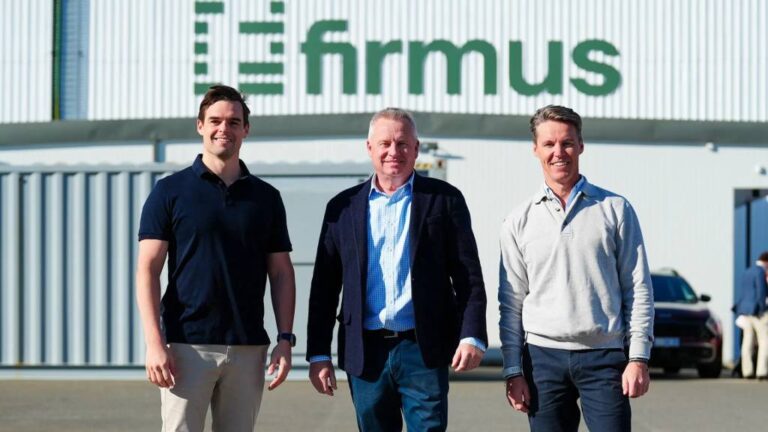Artificial intelligence and automation were the name of the game when it came to startup funding deals this week, with four out of the five startups with new funding embracing AI in some form.
Keep reading to find out more about the five local startups that collectively raised more than $340 million, including Firmus, which scored one of the biggest raises of 2025.
Firmus Technologies: $330 million

Leading this week’s funding round-up is artificial intelligence infrastructure company Firmus Technologies, thanks to a massive $330 million funding round backed by US chip giant Nvidia.
As reported by SmartCompany, local investor Ellerston Capital also invested in the Singapore-based company, which was founded in 2019 by Australian entrepreneurs Oliver Curtis, Tim Rosenfield and Jonathan Levee and previously headquartered in Tasmania.
The investment gives Firmus a valuation of $1.9 billion, and sees it join the select group of private Australian companies that are valued above $1 billion.
The involvement of Nvidia, which has a market valuation of US$4.3 trillion and is the most valuable company in the world, is being seen as a coup for Firmus, which is planning to list publicly in 2026.
Firmus was also backed in this round by existing investors Phil King’s Regal Funds Management, Archibald Capital and Tectonic Investment Management, while Alex Waislitz and the Pratt family are also shareholders.
Firmus’ Tasmanian facility, named Project Southgate, will form part of the state’s AI Factory Zone, which was unveiled by the state government in June.
“AI Factories are purpose-built to power, train and inference artificial intelligences,” said co-founder Curtis in June.
“With Tasmania’s clean energy and our AI Factory platform, we believe this will be the most cost-effective, sustainable AI facility in the world.”
H3D: $5.8 million

H3D, an AI-powered 3D printing startup creating custom healthcare products, has raised $5.8 million in a Series A.
H3D emerged from Swinburne University in 2018, its initial investor alongside Starfish Ventures.
Co-founder and CTO Dr Philip Kinsella developed the fully automated design technology at Swinburne. It’s made the startup a global leader in the hearing sector, producing hearing aids, noise protection, and custom-fit earphones.
The Series A was led by Significant Ventures, the VC arm of Canberra’s Hindmarsh family, with support from Swinburne and new investor Co:Act Capital.
H3D now has offices in Australia, Denmark and Ireland, and pioneered automated CAD (computer-aided design) technology that enables hearing labs to process hundreds of complex, custom-fit jobs in minutes.
The new funding will accelerate the introduction of the tech into dental labs globally and build on the startup’s commercial traction in hearing. A new, smartphone-based 3D scanning solution for custom-fit ear products has also been developed for roll-out.
Puralink: $2.3 million

Sydney-based startup Puralink has secured $2.3 million in pre-seed funding for its robotic ‘ferrets’ that can travel through pipes and detect leaks on their own.
Founded by Harrison Crowe-Maxwell, Shyeon Delnawaz and Long Tran, Puralink is on a mission to transform the way businesses and other operators conduct pipe inspections.
High-profile angel investors have also backed the startup, including Deputy co-founder Ashik Ahmed, Four Pillars Gin co-founder Matt Jones, and former NBA player Matthew Dellavedova.
Puralink previously raised $150,000 from two angel investors in 2025 and participated in both Cicada’s Fast Start program and the Startmate Accelerator.
The startup is currently taking pre-orders for its robotic ‘ferrets’, which have been designed to travel through, and inspect, complex pipe networks used in industries such as wastewater, storm water, energy and mining.
Escape This: $1.4 million

Escape room operator Escape This has secured $1.4 million from 357 investors via an equity crowdfunding campaign.
The Perth-based business used OnMarket for the campaign, which attracted an average commitment of more than $4,000 per investor. This compares to the typical OnMarket average of $1,800.
Escape This operates four venues in Perth and Sydney, which have been visited by more than 370,000 guests to date.
The five-year-old business recorded $6 million in revenue in the 2025 financial year, and around $1 million in net profit.
In a statement Escape This said it plans to use its new funding to expand into Melbourne and Brisbane.
Co-founder Bernie Janes said the level of interest from investors exceeded the team’s expectations.
“It is undoubtedly a tough crowdfunding market right now, but investors have recognised our strong business model and the healthy returns we are achieving, and they have voted with their wallets,” he said.
Isaacus: $700,000

Australia’s first foundational legal AI startup Isaacus, which is building sovereign legal AI models and tools for legal tech companies, has raised $700,000 in pre-seed funding.
The round was co-led by Aura Ventures and Galileo Ventures, and the funding will be used to bring Isaacus to market with significant customer traction already underway.
Isaacus has developed a massive, proprietary Blackstone Corpus (named after 18th-century English jurist), which covers laws, regulations, cases, and other legal data from the US, UK, Canada, Australia, New Zealand, Ireland, the EU, and the United Nations.
Founder Umar Butler is a data scientist and legal technologist who was previously the assistant director of data science at the federal Attorney-General’s Department. He set up the department’s data science function and oversaw all national-level AI projects.
The founding team also includes advisor Anthony Butler and engineer Abdur-Rahman Butler.
Butler said Isaacus is working to solve every AI and data pain point of the legal tech industry, from retrieval capabilities beyond those of general-purpose models to providing access to enormous untapped, highly proprietary legal data.
“Our mission is to support the next generation of legal service providers in democratising access to legal services through the delivery of best-in-class, sovereign, affordable foundational legal AI models,” he said.

